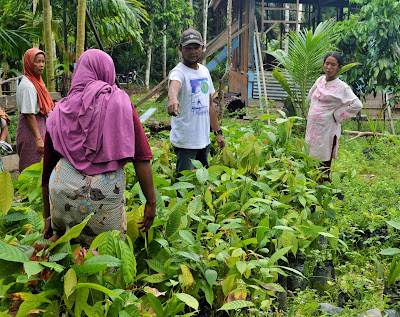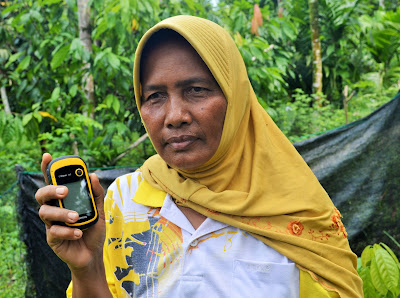The staff at JMD told me today that seven
women at the refugee camp In Bayeun (that’s the one in Aceh Timur that Robert
visited) escaped. That was really all he
knew, so I scoured international media (nada) and local media for more
information. One outlet, Lintas Atjeh,
added a bit more to the story . . . but not much.
Apparently
ten refugees (nine women and one man) left the camp on July 9th, but three,
including the man, were “successfully recaptured” at the Bayeun bridge about 30
meters away and brought back to the camp without incident. So seven are still “on the loose.”
It was
reported that the refugees had help from community members, but were spotted by
other camp members, who reported them to authorities.
[Are
you noticing, up to this point, my heroic restraint in sticking just to the
facts?]
The
police are, apparently, on the lookout for the remaining seven women.
So
many questions, so many possibilities.
Colleagues
here have asked me to speculate.
So I’m
speculating. That’s all. Just speculating.
Let’s start
with 2009, when JMD was involved in setting up one of the first camps for
Rohingya refugees in Idi, Aceh Timur.
There were about 200 men and teen boys—no women, and conditions were not
ideal. As JMD handed over the running of
the camp to provincial authorities and the Rohingya’s detention wore on, there
were many reports of abuse of the boys in the camps, and back then, if someone
“escaped,” there was no one from the authorities who went looking for them or
tried to bring them back. In fact, the
majority of those refugees from 2009 walked out of the camp; this was the way
that the province decided to address the problem and empty the camps. As is the case now, their country of origin
wasn’t going to take them back, and it was costing more than the province had
to keep the camp going. The solution?
“Escapes.” It was basically walk-offs.
You may
wonder why someone would want to leave a camp after coming from a place where
death or a lifetime of severe hardship was a near-certainty, only to face a
foreign land where you did not speak the language and had no visible means of keeping
yourself alive. But you have to remember
that most refugees, at least those from Myanmar, left in order to land in
Malaysia and then “disappear” into life there.
Only those who were rescued at sea or found by authorities on shore
either in Malaysia or took a wrong turn at the Malacca Straight and ended up in Aceh were sent to
camps—better than death, better than Myanmar, but not the original plan. The original plan was to blend in to the new
landscape and remain free to take advantage of whatever opportunities came
their way.
So for a man
anyway, landing in a refugee camp might be ideal for a week or two, but then
you want to leave and get on with it.
The difference this time, apparently, is that the authorities are
instructed to go after walk-offs and bring them back.
So what
about the women? Well, it could be that
the one man was the trafficker, and he agreed to take the women out of the camp
because they paid him. In 2009 we dealt
frequently with a trafficker there—they get swept up in the rescues as well,
after all. They usually speak more than the
language of the refugees, they know people, they have connections on the
outside (on many outsides) and they are always working the system. They are
consummate businessmen, and can’t make any money sitting in a camp. Unless
someone in camp is paying them to get them out of camp.
So this
man—let’s call him a trafficker (as in coyote,
not a sex or slavery trafficker, just a get-me-out-of-here trafficker) for
speculation’s sake—was either really bad at his profession or just a con man who took the women’s
money and then got himself re-caught to go back and get more money to do it
again. But then that begs the question:
why did only women go with him? What
would make just women, and no men, decide to pay a trafficker to help them
escape the camp? So he could have been involved in sex trafficking from before,
and these nine women were “his.” Or
something more nefarious was going on in the camp itself. Nine women and no men (except the male helper) leave the camp into a country they know nothing about, leaving their
children (one assumes), not speaking the language or having a skill or knowing
where they will stay or when they will eat--what was going on in that camp to
make them leave like that? How bad could it have gotten and why was it unbearable
for just the women?
This new
wave of Rohingya refugees is different because before, only the men came. Even though life sucked back in Myanmar, it
was thought to be too dangerous for a woman in the wilds of wherever these
people were going to end up. But now
women, little children and babies are here, which points to two really gruesome
things: life has gotten so bad in Myanmar that even small children are not
safe, and that the dynamic in a confined camp has now changed to where women
are once again prey: to other refugees, to camp officials and workers, to any
man who wants to take advantage of the situation.
-->
A friend who
I told about this wanted to do her own search, wrote me, “The only thing I
can find are generalized reports: women flee because Buddhist police formed murder
squads; women flee to avoid being sold to China for sex trade; women flee
because of gang rapes; abused women try to flee Ban
Mai Nai Soi refugee
camp in Thailand . . .” Do you sense a possible pattern here?
Remember, I’m just
speculating about this escape.
But I will
assure you, no explanation is a happy one.







